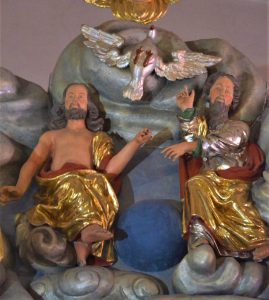The Christian creed confesses the triune God: Father, Son and Holy Spirit, and the church service is celebrated in His name. The word ‘Trinity’ (Latin: ‘trinity’) emphasises the unity of three persons. The expression ‘threefold God’, used more frequently during the margrave period, has right at its forefront the idea that the one God encounters us in various ways : the Father as the Creator, the Son Jesus Christ as the Redeemer, and the Holy Spirit as God’s power in us.

In the margrave churches you can (re-)discover the threefold God: as three separate figures, in the symbolism of the triangle, and hidden within the number three. Hymns from that time are written in a Trinitarian form, or frequently contain a ‘Glory Be’ verse : ‘Glory be to Father, Son and Holy Spirit’. Many churches are dedicated to the Holy Trinity. This took place during the period of the Ottoman Wars, when the Christian West was under threat. Belief in the triune God took on new significance as a feature distinguishing it from the equally monotheistic Islam. Some churches still retain the midday so-called ‘Turk’s chimes’ : three times the bells are rung thrice, supposedly in those days to call people to pray against the enemy – and nowadays ringing out for peace.
(Picture: Picture of the Trinity crowning the altar of St James’ parish church in Berg.)